Self-directed Noticing for Defossilissation: Three Case Studies
Abstract
This article discusses three case studies where researchers addressed specific aspects of their second language use which they perceived to be fossilised. The first case deals with a Korean researcher’s perceived lack of progress in speaking skills in English, particularly in active vocabulary; the second case looks at an English researcher’s problem with gender assignment and adjective agreement in German, while the third case looks at an English researcher’s difficulties with French pronunciation. Each researcher devised a treatment for his/her particular problem independently and applied the treatment, for the most part, autonomously. We argue that this kind of approach has the potential to lead to defossilisation but, more importantly, we argue that it is an invaluable way of raising awareness of the range of cognitive and affective strategies that are available to the learner, and the importance of metacognitive knowledge and strategies in deploying these resources to best effect.Downloads
The works published in this journal are subject to the following terms:
1. The Publications Services at the University of Murcia (the publisher) retains the property rights (copyright) of published works, and encourages and enables the reuse of the same under the license specified in item 2.
2. The works are published in the electronic edition of the magazine under a Creative Commons Attribution Non-commercial Share Alike 4.0.
3.Conditions of self-archiving. Authors are encouraged to disseminate pre-print (draft papers prior to being assessed) and/or post-print versions (those reviewed and accepted for publication) of their papers before publication, because it encourages distribution earlier and thus leads to a possible increase in citations and circulation among the academic community.
RoMEO color: green








